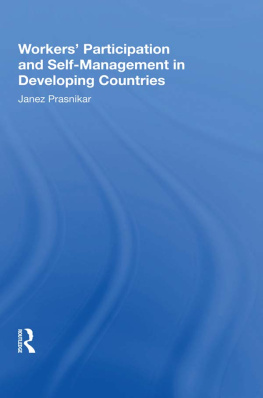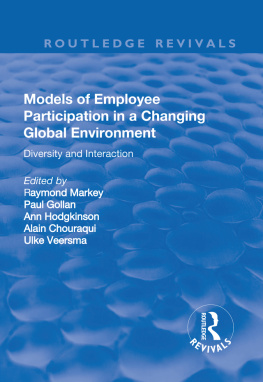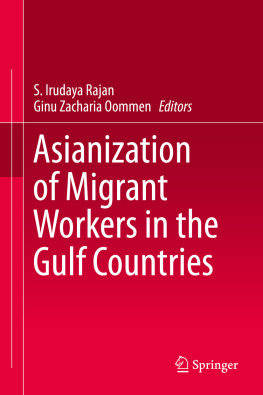Workers Participation and Self-Management in Developing Countries
To my parents
First published 1991 by Westview Press
Published 2019 by Routledge
52 Vanderbilt Avenue, New York, NY 10017
2 Park Square, Milton Park, Abingdon, Oxon OX14 4RN
Routledge is an imprint of the Taylor & Francis Group, an informa business
Copyright 1991 Taylor & Francis
All rights reserved. No part of this book may be reprinted or reproduced or utilised in any form or by any electronic, mechanical, or other means, now known or hereafter invented, including photocopying and recording, or in any information storage or retrieval system, without permission in writing from the publishers.
Notice:
Product or corporate names may be trademarks or registered trademarks, and are used only for identification and explanation without intent to infringe.
Library of Congress Cataloging in Publication Data
Pranikar, Janez
Workers participation and self-management in developing countries
/ Janez Prasnikar.
p. cm.
1. ManagementDeveloping countriesEmployee participation.
I. Title.
HD5660.D44P73 1991
658.3152091724dc20
90-26929
CIP
ISBN 13: 978-0-367-21393-0 (hbk)
This book represents an extremely valuable contribution to our understanding of an important subject the extent, form and merit of workers participation in management in developing countries. While the theoretical literature on the subject of workers participation is relatively advanced and a number of empirical studies exist in individual developed and, to a lesser extent, developing countries, this is the first comprehensive study of a large number of developing country cases within a broad, interdisciplinary framework.
Drawing on his background as an economist and a specialist on the Yugoslav system of workers self-management, Janez Prasnikar has analyzed an extraordinary amount of dispersed information on the experience with workers participation in thirteen developing countries. He has embedded the cases into a theoretical framework, drawing on the economic and sociological literatures. In the case studies the author discusses the institutional structure of participation in the diverse country settings. The cases are followed by an analysis of the major issues raised with respect to the existence and functioning of the participatory systems. The concluding section summarizes the main findings and policy conclusions.
This book is invaluable for all students of participatory and self-managed economies.
Jan Svejnar
I wish to thank the many people who contributed to this book. Special recognition goes to the founders and supporters of the research project, Workers Self Management and Participation in Decision Making as a Factor of Socioeconomic Changes and Economic Development in Developing Countries, and to the associates at the International Center for Public Enterprises (ICPE) in Ljubljana who executed the project. Without their dedication it would have been impossible to collect the extensive data explored here. Ales Vahcic guided and supervised the project and spent much time in organizing the collection and the analysis of the data. Vesna Smole-Grobovsek did secretarial work on the project. There are, of course, many others whose work cannot be identified in this book, but who provided substantial help during the research project.
I am especially grateful to Jan Svejnar and the Economics Department at the University of Pittsburgh, as well as to Jaroslav Vanek and the Program for Participation and Labor Managed Systems at Cornell University, where I wrote most of this book. It was a great opportunity to work with them and to use the facilities of both universities.
I wish to acknowledge additional thanks to my wife, Vesna, and to Robert Utman, who did most of the translation; I also thank Lauree Graham and Marinka Smodis for invaluable help in the preparation of the manuscript.
All errors that remain in this book are mine.
Janez Prasnikar
This book is a summary of Workers Self-Management and Participation in Decision Making as a Factor of Socioeconomic Changes and Economic Development in Developing Countries , an international research project which focused on issues of participation and self-management in several developing countries. The objective of the research project was to analyze the history of the introduction of workers participation and self-management and the incentives involved. The results of the first phase of the study were published in Workers Self-Management and Participation in Developing Countries (Sethi, K. 1983).
In the second phase of the project, research focused on the analysis of participation and self-management in the developing countries under study. The analysis involved the participation process and self-management, both on the global level and the enterprise level. In this case nine country syntheses were published in three publications of the ICPE. Several case studies were also produced and published in the three subsequent ICPE issues. The last phase of the project represented the comparative study of the results from the first and second phases of the project.
In , we summarize the basic findings of the research.
. The idea for this project came out at the fourth conference of the leaders of the nonaligned countries in Algeria (September, 1973) with the intent to investigate the problems of introducing self-management and participation in the developing countries and to offer suggestions for effective implementation. The formal constitution of the project in which nine developing countries took part was made in May 1976. Organization of this project was undertaken by The International Center for Public Enterprises (ICPE) in Ljubljana with the cooperation of The Institute for Social Studies in Hague.
. The countries included in this study are: Algeria, Bangladesh, Bolivia, Costa Rica, Guyana, India, Malta, Mexico, Peru, Sri Lanka, Tanzania, Yugoslavia and Zambia.
. The following comparative studies are used: M. Glas, Monograph in the Economic Issues (1986); B. Kavcic, Workers Participation and Self-Management: The Sociological Approach (1986); N. Mugendi, Workers Participation and Self Management: Its Politics and Comparative Perspectives (1986); V. Stambuk, Filozofsko-socioloski aspekti samoupravljanja in participacije (1986); K. Sethi, Workers Self-Management and Participation and Structure and Process of Work Organizations and Industrial Relations (1986).
The Overview of Theoretical and Empirical Literature Concerning Workers Participation and Self-Management
Theory of Industrial Democracy. Recently there has been increasing interest in the concept of industrial democracy. Outmoded organizational theories
Contrary to the theory of limited participation, or partial control, the theory of self managed decision-makingas a means for decreasing alienation, while building a freely managed society in which each person can develop his or her personality.
Forms of Workers Participation . Clarke et al. distinguishes between participation concentrated on work tasks (work-centered participation) and participation concentrated on the distribution of power (power-centered participation). The former is described by the Human Theory Approach. The latter is focused on the control of workers in decision-making and in the distribution of power.






